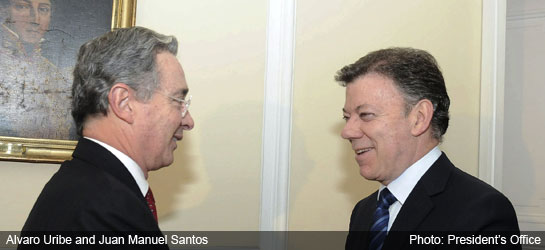
President Juan Manuel Santos and his predecessor, Alvaro Uribe, resumed their long-standing public feud Tuesday with a series of scathing statements.
After a government-sanctioned study indicated Thursday that 34% of online criticism of the Colombian government reported on by international media was in response to tweets from Uribe, Santos said to televsion station Caracol, “In all measurements on negative news of the country abroad, do you know where they come from? From the FARC and former President Uribe.”
“The government’s discrediting abroad is not on behalf of Uribe, it’s on behalf of the FARC and [the government’s] relations with the Chavez dictatorship,” responded Uribe. ‘When the government ignores the problems of the Chavez dictatorship to make relations appear fine although [Venezuela] is still sending guerrillas to kill our soldiers, that creates a lot of uncertainty abroad,” he added.
Uribe has long been a vocal critic of Chavez, accusing him of turning Venezuela into “a haven for terrorists,” in a May tweet. The ex-president threw his support behind Henrique Capriles, an opposition candidate in Venezuela’s October presidential elections.
Colombian ex-senator and hostage negotiator Piedad Cordoba accused Capriles of receiving financial support from Colombian companies with paramilitary connections in June. She had previously criticized Uribe, calling him a “paramilitary president” over his alleged connections with right-wing armed groups during his eight-year presidency between 2002 and 2010.
Uribe is a prolific tweeter who has often used his account to criticize Santos and the current administration’s policies. In April, Santos, who served as defense minister under Uribe between 2006 and 2009, said “he doesn’t lose sleep” over his the former leader’s tweets.
Commentators identify Santos’ policies recognizing Colombia‘s armed conflict and its victims of state violence, his efforts to prosecute corrupt politicians, many of whom were protected during Uribe’s regime, as well as his willingness to discuss drug legalization as the main reasons behind the two leaders’ ongoing rift.

